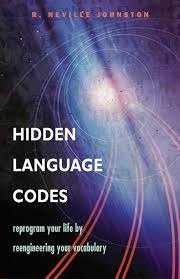R. Neville Johnston (* 1950)is an author, host of the long running TV-show Telepathic TV, and a practitioner doing past-life work, sound healing and Mayan astrology; and he teaches Palmistry. In 1977 he was shot, had a near-death experience and saw during this experience on the other side a prequel to his current live. You can find more about it on this youtube video:
He believes, that the more of us can increase our consciousness, meaning to reach a higher frequency, the quicker the paradigm will shift and the sooner we will be united as one race, and one world. He is available for private sessions including phone sessions.
I have read two of Neville’s books, “The Language Codes” and “Hidden Language Codes”. Both of them are built on the premise that all things exist within a Quantum Field, a field in which all things are vibrating.
In “The Language Codes” (72 pages) the author leads us through the maze of our own language, guiding us past the pitfalls that we have been preconditioned to ignore. He addresses concepts such as angels, Karma and Christ as well as feelings such as anger and guilt. But he also addresses the main theme of this site, that we have to work on ourselves and says. “It may be fruitless to attempt to change anything in our external world, because it will only perfectly reflect the internal world. Therefore, the only work that can be done is work on ourselves.”
“The Hidden Language Codes” (169 pages) is a book about thought. Neville explains that we think in words and in order to reach a higher frequency we have to change the very words we think with. In other words, the book is about rewriting the language in our head.
He addresses principles such as: “What you hate you recreate until you love it” and that the idea that we can control others is an illusion.
He defines on a spiritual level words like obsession, sadness, shame, and stress and teaches us power words – such as acceptance and faith.
On the back of this book we can read that “our language is full of unconscious triggers” and as long as we continue using them “and victim our way through life, we sabotage out own goals and happiness”.
The concept of thought forms has also been addressed by the Theosophist Annie Besant.
